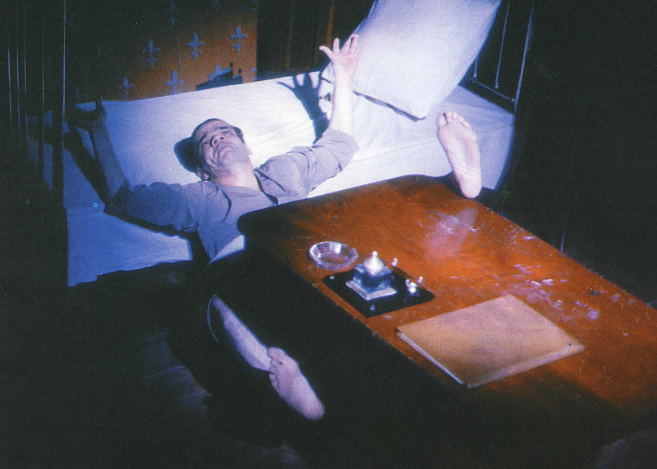| Directed by: | Valeri FOKIN |
| Music: | Alexander BAKSHI |
| Set Design: | Vyacheslav KOLEICHUK |
| Costume Design: | Anna KOLEICHUK |
| Choreography: | Leonid Timtsunik |
| Assistant Director: | Youri Fainkin |
| Stage Assistant: | Nadezhda Klintsova |
| Musicians: | Lyudmila Bakshi (soprano) Igor Ageyev (alt) Georgori Nadirov (alt) Alexei Sokolov (violin) Mikhail Ashurov (violin) Andrei Chertyl (violin) Alexei Narochny (violin) |


It was quite a while ago when we first started thinking about Kafka's «Metamorphosis». The poetics of this piece came to be in line with the direction of the search for performance we had been engaged in for several years then. We could repeat after Kafka: «The effect of theatre is the strongest when it turns things unreal into real ones. Then the stage becomes the periscope of the soul, allowing to study reality fr om within».
authors’ note:
Valeri Fokin, the author of the adaptation and the director of «Metamorphosis», works in co-authorship with the composer Alexander Bakshi; they clearly formulate the principles of their creative search: «Making a production, based on a piece of prose or visual art, we don't write scripts or adaptations for the stage.
We use the techniques of theatre to grope for an equivalent of the style and poetics of the chosen author. In other words we create an aufonomous piece of theatre wh ere a word is only a component equitable with sound, light, gesture and space», No doubt, this search for almost non-verbal contact with the audience reflects our times' general disppointment in word. The word that have been the basis of the traditional psychological theatre is devalued today; being aware of its exhaustion, Fokin turns to what he calls «instrumental theatre» with its live sound, abstraction and conventions. He returns to myth and works at the meeting point of reality and unreality, breaking the borders between them, seeking to give free rein to unconscious. Following this way, Fokin, this prudent manager of his own success, followes Grotovsky. Recalling his lessons, lessons of his youth, he returns to creative life.
We use the techniques of theatre to grope for an equivalent of the style and poetics of the chosen author. In other words we create an aufonomous piece of theatre wh ere a word is only a component equitable with sound, light, gesture and space», No doubt, this search for almost non-verbal contact with the audience reflects our times' general disppointment in word. The word that have been the basis of the traditional psychological theatre is devalued today; being aware of its exhaustion, Fokin turns to what he calls «instrumental theatre» with its live sound, abstraction and conventions. He returns to myth and works at the meeting point of reality and unreality, breaking the borders between them, seeking to give free rein to unconscious. Following this way, Fokin, this prudent manager of his own success, followes Grotovsky. Recalling his lessons, lessons of his youth, he returns to creative life.
Valeri Semenovsky, ART«PRESTIGE:
In Raikin's character human feelings and reactions of insect suppress each other by turns. Turning out an insect, proving to be an insect, Zamza is fully antipathetic — Raikin plays this metamorphosis bravely and brilliantly. Getting his food on a sheet of newspaper [...] insect Zamza tap-dances on his forefeet, gobbles everything, then, growing heavy, crawls to a corner for better digestion. Slowly are moving his feelers and twitching his full belly — and suddenly a muddy pellicle covers Raikin's eyes. It is because of this pelicle that we feel unwell...
But when unhappy Zamza crawls on a wall to look once again at his sister (and Raikin's crawling is so easy; it looks as if he does not feel his body's weight and does not need horizontal foot-hold), when he hides himself under his bed in order not to frighten his mother, when he, weakened, more repudiated and more humble than Job, lies in his corner — then anguish and compassion oppress our hearts and these feelings are growing as we are realizing that Gregor Zamza has been guilty of nothing and therefore he has no hope.
But when unhappy Zamza crawls on a wall to look once again at his sister (and Raikin's crawling is so easy; it looks as if he does not feel his body's weight and does not need horizontal foot-hold), when he hides himself under his bed in order not to frighten his mother, when he, weakened, more repudiated and more humble than Job, lies in his corner — then anguish and compassion oppress our hearts and these feelings are growing as we are realizing that Gregor Zamza has been guilty of nothing and therefore he has no hope.
Alexander Sokoliansky, The Moscow Observer